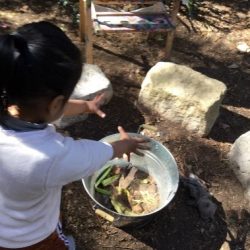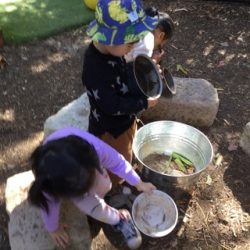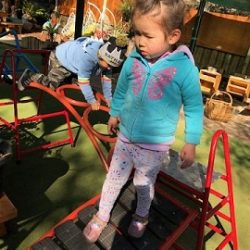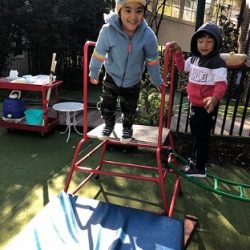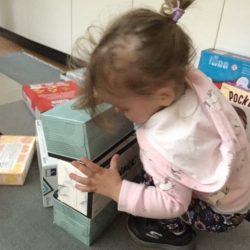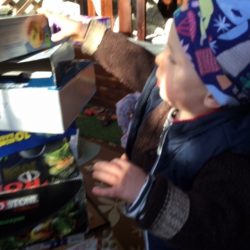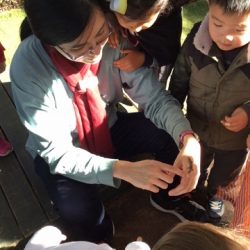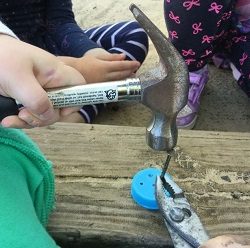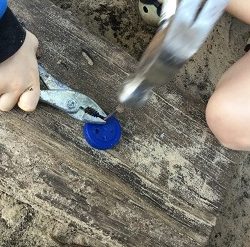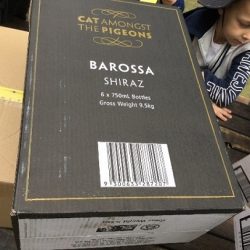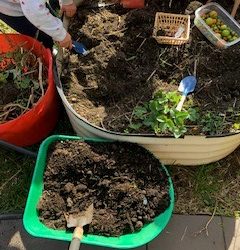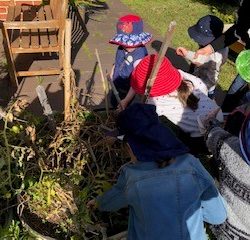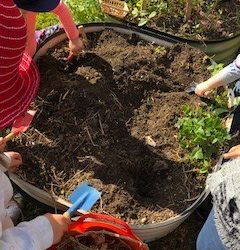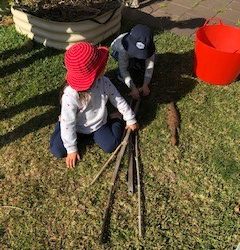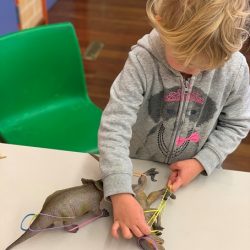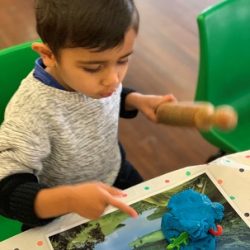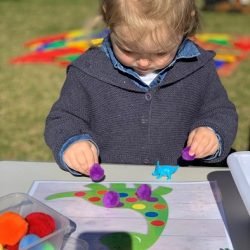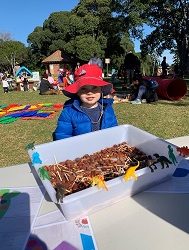Johnson House
Toddlers
How Do You Make Wombat Stew?
To continue to follow the Johnson House toddler children’s interest in Australian animals, and to build on their existing knowledge of these, we shared the story ‘Wombat Stew’. The children were eager to discover what the animals suggested should be put into the stew and we anticipated what might happen to the wombat at the end of the story. ‘Wombat Stew’ is a wonderful book for the children to participate in, as the text is repetitive and rhymes, which encourages them to say or sing the words as we are reading together. At the conclusion of the story, we had a discussion about how we might make a stew, and what to put into it. The children were very thoughtful in their suggestions.
The children were very enthusiastic about creating their own wombat stew. As the children engaged in the experience they were continuing to facilitate their language development as they contributed their ideas to our discussion and shared their resources together as they made their stew. The children were also continuing to build on their cooperative play skills as they took turns to add materials to their pot and supported each other as they collected the sand, leaves, mud and coloured feathers.
Preschool
The children in Johnson House preschool have found the recent change in the obstacle course both exciting and challenging. It has been a great opportunity develop their gross motor skills, as well as to work on social skills such as turn taking, listening and following instructions. The children have been observed practicing their balancing skills on the beams and using problem solving skills as they navigate the rock climbing platform and climb on a variety of ladders within the course.
Murray House
Toddlers
In Murray House toddlers, we often have surprise visits from creatures in the natural environment, allowing opportunities for spontaneous learning. Two weeks ago, we had Shum Shum the stick insect, which we have set free to find his family.
This week educator Denise found a little gecko lizard. The children were fascinated by the tiny sleek creature as it was perched on Denise’s hand. They observed its stillness and asked why it was not moving. Denise speculated the lizard might be scared and perhaps remained still to protect itself. One of the children noted that the little lizard must be a baby, thus utilising her reasoning and observational skills. The other children seemed to agree with this idea, and began speaking to the lizard softly, as one would do to a small child. Together they observed the creature and identified its body parts, such as its eyes, mouth and ears. When the baby gecko began to move, the children squeaked and screamed at how fast it was as it slithered up and down Denise’s arm. Denise explained to the children that maybe it had to move quickly to escape larger creatures and be safe. One of the children then reminded her peers to be gentle with the baby gecko so as not to frighten it. When a ray of sunlight hit its tiny body, Denise encouraged the children to observe how the light made its scales look shiny. One of the children observed that there were rainbow-like colours reflecting on its skin, of which her peers then took notice. It was quite a lovely sight to behold! One of the children suggested we place it somewhere safe so that it could find its mother, while another child suggested that they could place it in the grass on the other side of the fence where it could find its family. They waved goodbye to the tiny creature as it slithered away into the grass. This experience has further developed the children’s understanding of and respect for the natural environment.
Infants
The children in Murray House infants have been exploring building and manipulating using tins, bottles and other open-ended resources in the room. To respond to our children’s interest in this, educator Queenie has been focusing on supporting children’s play by providing a variety of boxes. Children used their big and small muscles to lift the boxes and to stand on tippy toes to reach high. They exclaimed “Yay!” to express their excitement and joy, and they clapped their hands when they successfully completed their work. Eyer (2007) suggests that lightweight boxes are a great resources that encourage building skills. This experience also facilitated movement, including squatting down to pick up boxes, which supports the development of children’s balancing skills, and the development of strength and control in their leg muscles. The children have also been collaborating with others as they showed an interested in contributing to the group building experiences.
Robinson House
Developing sustainability awareness
Over the last few weeks some of the children in Robinson House have been learning about recycling through intentionally planned learning experiences. Our aim is to assist them to develop an understanding and awareness of the importance of recycling to look after our environment, for example, to reuse and recycle resources as well as reduce the amount of rubbish taken to landfill. The learning experiences enable us to regularly engage in conversations with the children about recycling and to reinforce the importance of this.
The learning experiences offered to the children over the past few weeks include: playing a matching and memory game with pictures of things that can be recycled; building with cardboard boxes; and making watering cans with milk bottles. The children seemed to really like to make holes in the milk bottle lids. Some of them worked individually, while others worked in pairs. The children learned to use real tools safely by holding the nail in place with pliers while hammering with a hammer to create the holes. This experience that fostered children’s concentration, coordination, and fine motor skills.
Family Day Care Sydney Wide
Authentic gardening experience
A glorious sunny morning at Family Day Care Sydney Wide Randwick Playgroup, and the children eagerly engaged in yet another gardening experience with Barbara. With smiling faces and energy to burn they surrounded the large planter pot waiting for instruction. Our recent explosion of delicious tomatoes had reached their limit, and it was time to replant and start again.
The area had been well prepared in advance with small spades and trowels for digging, wheelbarrows for transporting, and compost fresh out our compost bin.
The children immediately got to work, removing the tall sticks and collecting and organising them into a pile to be reused. Clearing out the pot of dried twigs, debris and remaining tomatoes brought about many questions. The children were well aware of what is considered recyclable and what is not, and they also separated these into piles. They took great care of the small worms they found.
Once the children were happy with their smooth container of soil they dug holes to add the compost and prepare the soil for our new seeds. With precision and care they sprinkled tiny seeds into the soil. Now we all have to wait patiently as we care for and observe what our hard work will produce.
Hopefully we will soon be harvesting beetroot and spinach for all to sample. Children engaging in gardening are enjoying:
- Outdoor sunshine
- Developing their fine motor skills
- Learning patience and learning to predict
- Learning linguistic, mathematical and scientific concepts
- Taking responsibility for their environment
- Healthy eating as they sample the goods.
Playgroups
Over the past few weeks the children at playgroups have shown an interest in dinosaurs. We have been exploring the world of dinosaurs to develop their gross and fine motor skills through a variety of dinosaur-themed activities such as sorting colours, frozen in time, creating a forest with playdough, making dinosaurs at the craft table, doing puzzles, dancing and stomping during group time, and reading stories all about dinosaurs.
